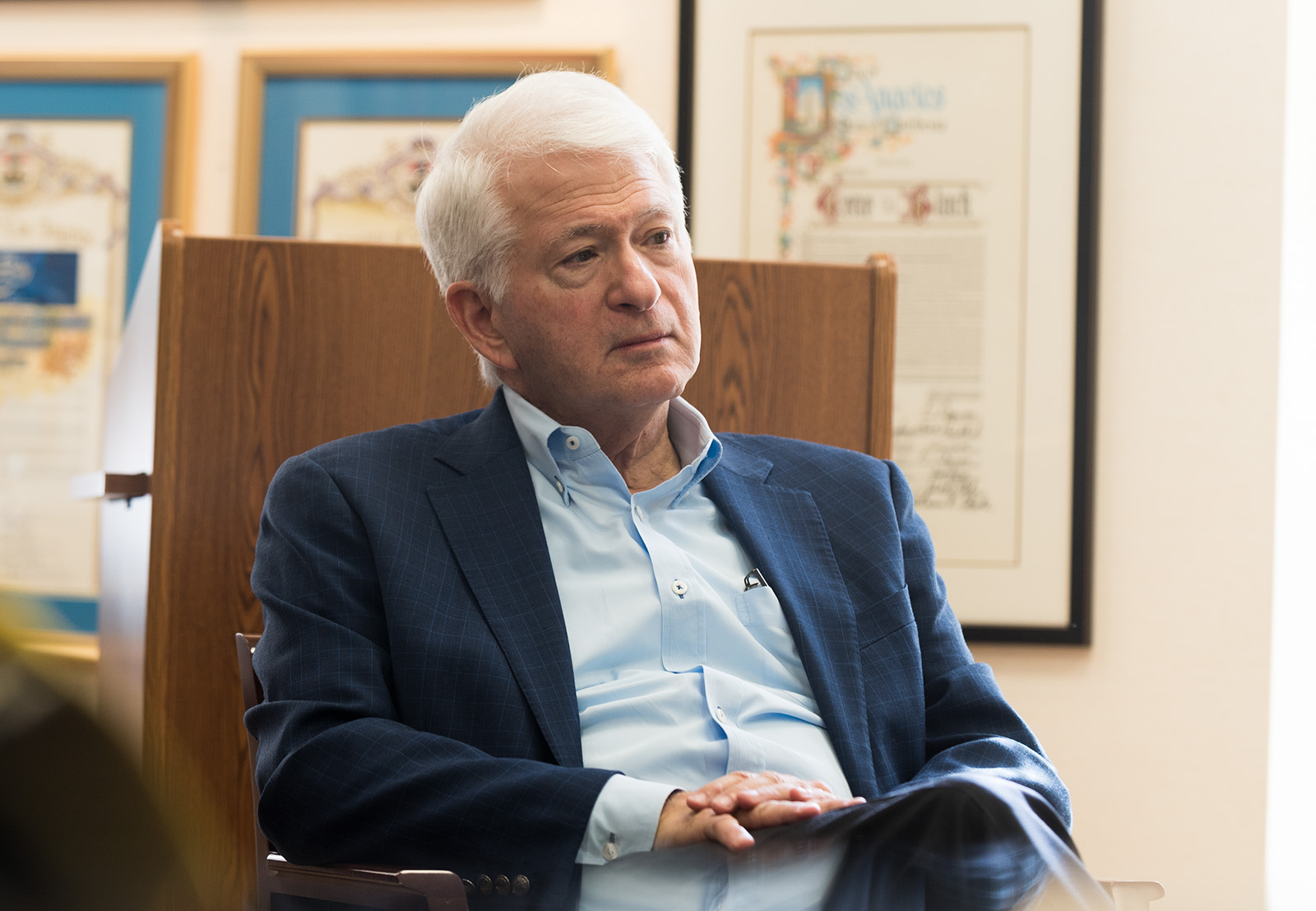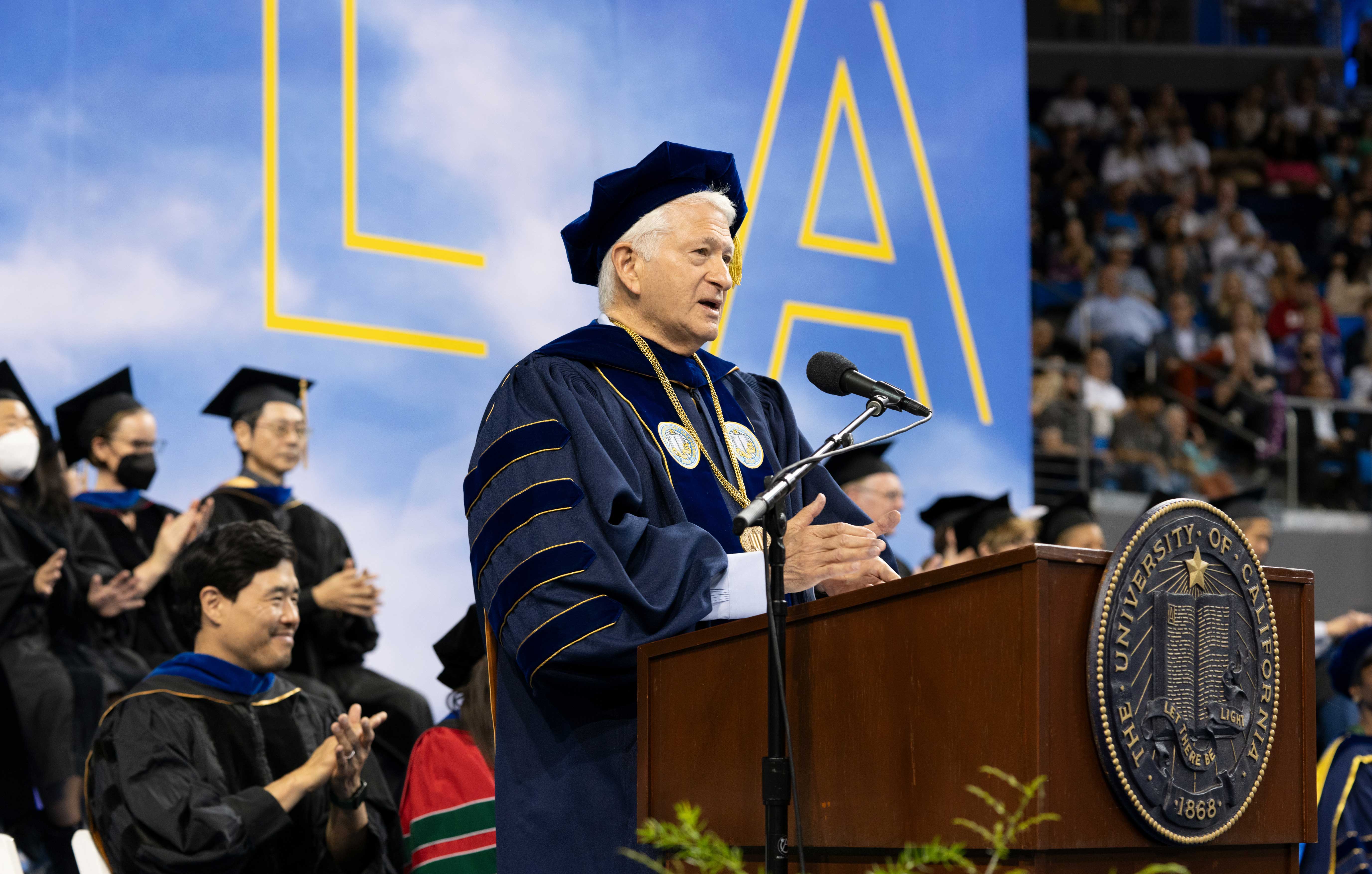Opinion: Creativity through departure from convention can help tackle writer’s block

By Helen Juwon Park/Daily Bruin
By Logan Shobe
April 21, 2024 11:24 p.m.
Writing can often feel like an exercise in fruitlessness. And yet, I can’t help but shake the notion that if I were to just approach it from the right angle, it wouldn’t prove to be so unapproachable.
The truth is that many authors will spend a lifetime honing their craft. After all, the majority of a writer’s painstaking work often remains unseen, as countless drafts are refined to a single final piece that only vaguely echoes the many prior efforts.
At its worst, this reality can be paralyzing. Long spans of motivational drought, of great work and little gain, often predict self-scrutiny. Over time, a writer may begin to question if their effort is really of much use at all, wondering, “If writing comes so easily to others, while I always seem to struggle, is it even worth it to pursue this for the rest of my life?”
Looking at authors such as Stephen King – perhaps the world’s first most prolific penman of American horror literature – the origin for these thoughts can be made dispiritingly clear.
Throughout his career, King has published over 60 unique feature-length novels. To say King’s work ethic is impressive would be an understatement. Rather, it is practically unparalleled.
When comparing oneself to a successful writer like King, it’s fairly easy to attribute achievements to inborn talent or some illusive drive others lack, leading to discouragement regarding one’s own abilities.
However, when you sit back and evaluate King’s meteoric rise to fame over the years, it is clear that he is no prodigy. Instead, King claims that his success was the simple product of self-discipline above all – something fundamental to each of us, should we choose to grasp it.
Nevertheless, it’s going to take effort and especially time. In conversation with George R.R. Martin, writer of the ever-popular “A Song of Ice and Fire” series, King attested to writing for three to four hours each day consistently. Sometimes, the metrics involved in success can be staggering.
Every writer should know that this beloved hobby demands careful patience. Therefore, it is especially important to grant yourself grace in uncovering how the rhythm of writing fits your own personal groove.
So, how can we seek to motivate ourselves as creatives? How can we teach ourselves the practice of self-modulation and eliminate those intrapersonal pitfalls of doubt and insecurity that are so common in young, developing creatives? And how can we ever hope to emulate the rigor of a Kingian writing routine to its maximum effect?
Here’s what helped me.
In his article, “Rigid Rules, Inflexible Plans, and the Stifling of Language: A Cognitivist Analysis of Writer’s Block,” late UCLA education research professor Mike Rose performed an informal survey of 10 different UCLA undergraduate students, all of whom wrote frequently as a part of their regularly scheduled coursework.
According to Rose, the students who struggled the most with their writing were grappling with the application of rules and guided outlines. While intended to condense and simplify the writing process, strict adherence to these tools often led to a delayed process as students struggled to create within confines.
As seen in one student Rose interviewed, writing can often be made more difficult when these and other “vital” rules of thumb pervading modern writing education get in the way, such as, “your essay needs to start off with a good hook!” or “use up to at least three body paragraphs!”
In Rose’s book, “Writer’s Block: The Cognitive Dimension,” he found that students who struggled less with writing obstruction applied only one-fourth as many of these hindering rules as did those who were considered more prone to writer’s block.
Although Rose’s works were first published in the 1980s, the students’ experiences reflected many of my own difficulties. Throughout my life, my teachers emphasized the importance of convention, whether it be the creation of guidelines, self-imposed criteria or step-by-step procedures. While I trusted that my teachers instructed me with good intentions, I often found myself grappling with these sets of perfecting clauses.
In my mind, anything I ever conceived of had to be uniformly trimmed and pampered before I could move on to something new in order to follow the plan. In that way, writing was stifling. I hadn’t thought there could be a better way.
So, how did other students succeed when I, and likely many others, have failed? It is important to understand that the key here is not to abandon outlines and other literary conventions entirely. They can still be useful in the right context. Rather, according to Rose, the defining characteristic of a writer’s productivity was flexibility.
While the more successful writers did apply some rules rather fixedly, these were generally more simple and less restrictive than those that plagued their peers. Rather, these students tended to only one rule above all: Nothing should come before their better judgment when it came to their own writing.
It’s as simple as that. Know the rules as they are, and know when and why to deviate from them.
I endured a similar sort of reconditioning in my own writing. For a time, all that I could produce had to be perfect. As one might expect, I did not produce very much. This proved to be quite the hurdle.
No matter how many times I tried, the premeditation of perfection proved itself impossible. I had to reevaluate. Instead of seeking to meet the mark my first time around, I learned to let loose. Of course, the end product wasn’t what I had envisioned. However, at the very least, it was an end product.
Over time, I could return to my work with a clearer head. It was no longer about the starting but the finishing. Instead of building something completely from the ground up, I could instead write from within its framework.
I wrote my first-ever short story using this method. If I had never changed my strategy, I don’t know if I would have ever written anything at all.
Of course, what worked for me will not work for everyone.
Rose’s findings represent only one facet of what can make writer’s block so difficult to overcome. In a 2019 article, a researcher found that, along with changing one’s writing method, a variety of solutions, from taking a walk to conferring with others could prove just as effective.
While Rose’s findings spoke most to my own experiences, the issue of writer’s block is a broad one. What doesn’t work for one person may work for another – all that is required is the ambition to seek improvement in the first place.
For a long time, I did not consider myself a writer. I had never published anything substantial, and my talent was often fleeting when I finally sought to produce. I believed that I would never improve, that I had some sort of cognitive muscle that would always be weak. I envied the works of others and the abilities I believed came naturally to them.
Put simply, I was a defeatist.
However, like any other skill, I discovered that proficiency in writing can be wrought through patience and industry over time. However, that doesn’t mean it will be easy or that each of us approach it facing the same difficulty. Nonetheless, I believe that the mind is near endlessly generative, and I think it would do many of us a lot of good to remember that.
Of the various strategies I’ve learned during my time at UCLA, my favorite is one of the simplest: Just fake it till you make it.
So, while I certainly hope to learn how to restructure my time or start playing by new rules, I think the best kind of resolution begins in the heart – to believe in yourself first and never once stop believing.






